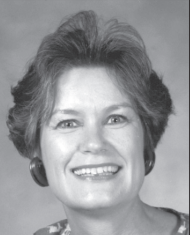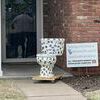Charlotte Hollopeter Coffelt

Charlotte Hollopeter Coffelt passed away February 16th, 2021 in her Kingwood home surrounded by her family and caring nurses.
She leaves behind her loving husband of 62 years, Don, four of her sisters, Virginia Bracken Awtrey, Marilyn Sherrod, Judy Turner, and Charlene Burns, her three children, Lori Christian Hathaway, Michael Coffelt, and Amy Coffelt, and five grandchildren Charlotte, Catherine and Camille Christian, and Austin and Savannah Coffelt, and their spouses. Charlotte was born the third of eight daughters of Esther and Charles Hollopeter in Salina, Kansas on December 20, 1938.
During her father’s tenure with the U.S. Soil Conservation Service, she resided in Fort Worth, Texas and Shawnee, Oklahoma before the family settled on a small farm southeast of Blackwell, Oklahoma. Charlotte graduated from Oklahoma State University with a Bachelor of Science in elementary education in 1960. Charlotte had an incredible passion for public service. She first served as an educator and fierce advocate for public education.
Charlotte taught school in both Oklahoma and Texas public schools, and served as a principal of two elementary schools in the Atascocita area of Humble ISD after she obtained her Masters of Education Administration at Sam Houston State University. While raising her three children in Ponderosa Forest in Spring, Texas, Charlotte was the first educator elected and served two terms on Spring ISD’s board of trustees, eventually serving as president. Charlotte firmly believed that a quality education was the most necessary foundation for a prosperous community and nation. She also held the belief that learning was a lifelong endeavor. Her children, grandchildren, and friends will fondly remember Charlotte as someone who always had a newspaper or magazine article she found informative ready to pull out of her purse and share with others.
She loved to travel and learn about each place and its history. She continued to take college courses from both local and remote universities into her seventies, and loved to take her grandchildren to visit museums and see plays or ballets. Charlotte always had a commanding presence. She was bold and passionate- qualities that aided her in her lifelong advocacy for justice. Charlotte actively engaged in political activities, running for a position on the Texas State Board of Education in 1998 and her area’s seat in the Texas House of Representatives in 2004 as the Democratic nominee for both campaigns. She was a founding member and the second president of the River Oaks Area Democratic Women. She was also an active member of the Kingwood Area Democrats and the Harris County Democratic Party.
Charlotte served for 6 years as a board member of Americans for the Separation of Church and State in Washington, DC. Charlotte grew up as a farmer’s daughter, and during her middle and high school years, she was assigned the responsibility to milk the cows morning and evening. She enjoyed the evening chore) and would on most occasions need to walk westward through wheat or alfalfa fields west of the barns to corral the cows and guide them into the barn where they would be stationed in a manner that they could be milked one by one.
She would say that she always fondly remembered the earthy and fresh smell of the wheat fields where she would find the grazing cattle and guide them into the barn. Charlotte made her preference for cremation clear to her family. “Ashes to ashes, dust to dust,” she would say; “just knowing that whatever remains can be mingled with soil would make a lot of sense to me.” Charlotte’s remains will join her mother, father, and two of her sisters whom proceeded her in death, in the Eddy New Home Cemetery in Grant County, Oklahoma, a location very close to where her paternal grandfather’s 160 acre farm settled in 1893.
A memorial service will be scheduled at a later date.
“Joy can be real only if people look upon their life as a service and have a definite object in life outside themselves and their personal happiness.” Leo Tolstoy
Please support The Blackwell Journal-Tribune by subscribing today!
You may also like:

.jpg)




